On a stage in front of the CBC building in downtown Vancouver, Marcella Williams is telling a small crowd that the BBC, CNN and the CBC all recently stopped reporting in Russia. The news organizations took the step after a new law threatened up to 15 years in prison to anyone who spreads information that doesn’t align with the Russian government’s portrayal of the war with Ukraine.
“Journalists are now at risk of jail,” says Williams, who campaigned for the People’s Party of Canada during the 2021 federal election.
“Do you want to know why?... They were suspending reporting in Russia to protect their journalists after a new law threatened jail terms of up to 15 years for spreading fake news.”
At the words “jail terms” and “fake news,” the crowd cheers and claps.
“Don’t we get enough fake news in our own country?” Williams asks. “Would you not say that this is an admission that they’re saving their journalists from writing fake news?”
Across the country, “freedom convoy” protests are still regularly popping up in Canadian cities, following a three-week occupation in Ottawa that sparked a national crisis and a reckoning for the capital city’s police. Although the satellite protests have been smaller than the gathering that took over downtown Ottawa, extremism experts say it’s important to continue to track the movement as pandemic restrictions fade.
“What I have noticed with this movement, particularly this kind of anti-mandate movement, is the level to which they are willing to make this fight personal,” said Stephanie Carvin, a professor of international relations at Carleton University.
“This isn't a disagreement about policy in the way that you can normally have a disagreement.… They have taken their fight to the homes of city councillors, provincial leaders, health-care workers.”
While many of the protesters in Ottawa appeared to be simply frustrated with pandemic rules and restrictions, some convoy organizers had links to the far right, while others proposed forming an unelected governing entity that would override provincial and federal decisions on COVID-19 restrictions. Some of the protesters were vehemently against vaccines or did not believe that COVID-19 was as dangerous as public health officials and government have said.
In Ottawa, convoy protesters gathered in front of the Parliament buildings and spread out through downtown. In Victoria, Edmonton and Winnipeg, similar protests have been located near provincial legislatures. In Calgary, vehicles and people have congregated near a park in a downtown neighbourhood.
In Vancouver, protesters seem to be intensely focused on the news media, attracting around 100 people every weekend outside the offices of news broadcasters like CTV and CBC. Local organizers James Davison and Williams blame the media for what they say is an overreaction to an illness that has killed over 37,000 Canadians since 2020.
The comments aren’t new for Williams. In 2021, the Georgia Straight, Vancouver Sun and Burnaby Beacon reported on comments Williams had made on her Facebook page: after posting a meme that wrongly said journalists were prosecuted during the Nuremberg trials and “put to death for lying to the public,” Williams had commented “Should happen again!”
She later deleted the post.
Journalists in Ottawa reported being frequently harassed and sometimes assaulted by convoy protesters, and it’s been happening in Metro Vancouver as well. Protesters have been gathering at the Pacific Highway border crossing in Surrey, and on Feb. 19, crews from Global News and CBC were surrounded, yelled at and spat on, leading them to seek refuge in their vehicles under a police escort. On March 4, a Canadian Press reporter doing a story on rising gas prices in Vancouver said a man shoved him and accused him of “controlling the mainstream media.”
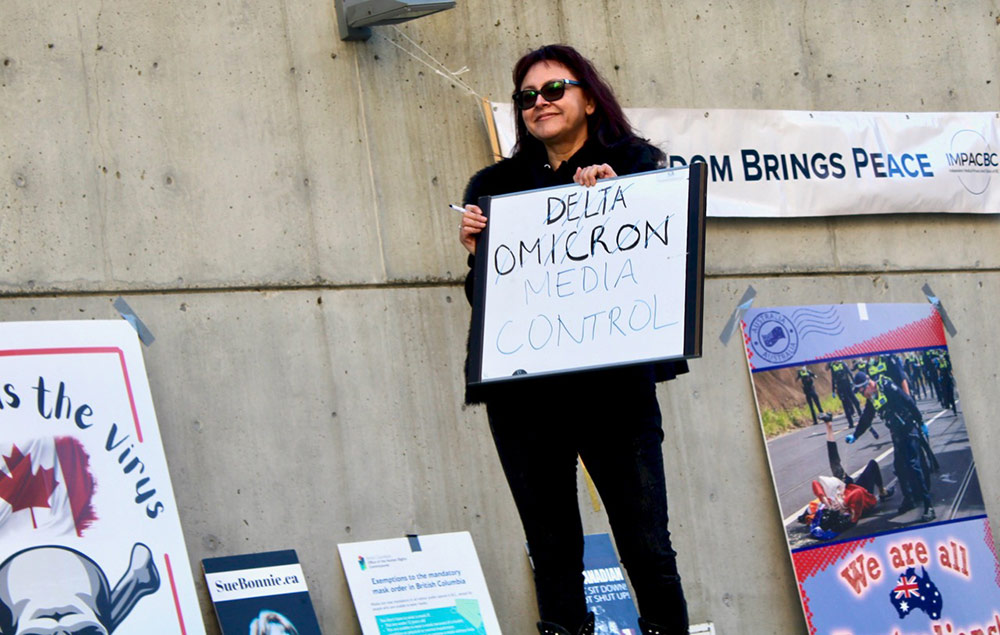
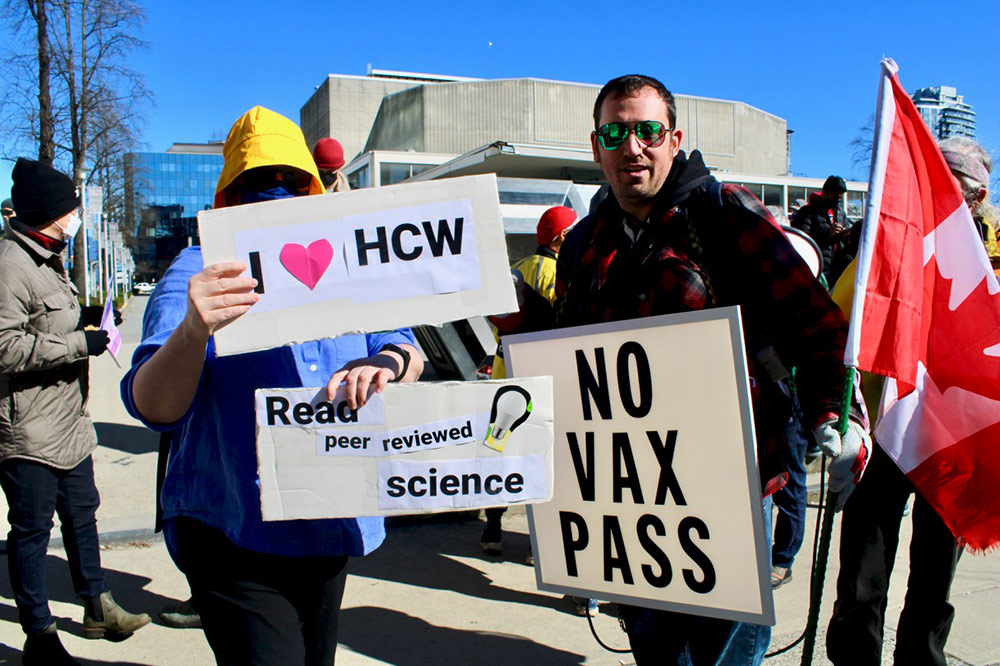
People attending the protest in front of the CBC building on March 5 said they’re angry news media has not been reporting things they deeply believe to be true, such as COVID-19 vaccines being dangerous, COVID-19 not being a very serious illness, and a belief that the World Economic Forum is secretly controlling the Canadian government.
One man who gave his name as Chris said it’s unfortunate to see reporters and camera operators yelled at and abused — but he also said the media have “brought it on themselves by serving this globalist interest” and regurgitating “the left’s talking points.”
Chris said he believes the World Economic Forum is controlling the Canadian government, a conspiracy theory known as the “Great Reset” that took hold during the pandemic. He also believes that journalists who work for large media outlets are told what to say.
“They’re either ignorantly regurgitating the talking points, or they’re on board with it and they’re actively doing it,” he said. “If they’re actively doing it, that’s actually treason.”
Carvin said the way the convoy protesters are targeting the media is similar to the way they have been targeting politicians, and are often viewing the news media as the mouthpiece of government. They’re using language “imported” to Canada from former President Donald Trump and his supporters.
“So your political opponent isn't an opponent — they're an enemy, they’re treasonous, they need to be put in jail,” Carvin said.
“If you don’t agree with them, they're a fundamental threat to your existence.”
Carvin said the tactics used by anti-vaccine and convoy protesters have included throwing small rocks at Prime Minister Justin Trudeau’s head during an election campaign event, spitting on journalists or yelling obscenities at health-care workers and patients. In B.C., the provincial government introduced legislation to stop protests at hospitals, vaccination clinics and schools because of anti-vaccine protests where people were being harassed.
“The tactics they're using are not political — it’s gone beyond that,” she said. “These are extremist tactics.”
During the Ottawa protests, there was a lot of frustration with police as protesters took over the city with apparent impunity. Carvin said there needs to be consequences for people with these views when they cross the line from heated rhetoric to actual threats or violence, and police need to take all reports of death threats or violence seriously.
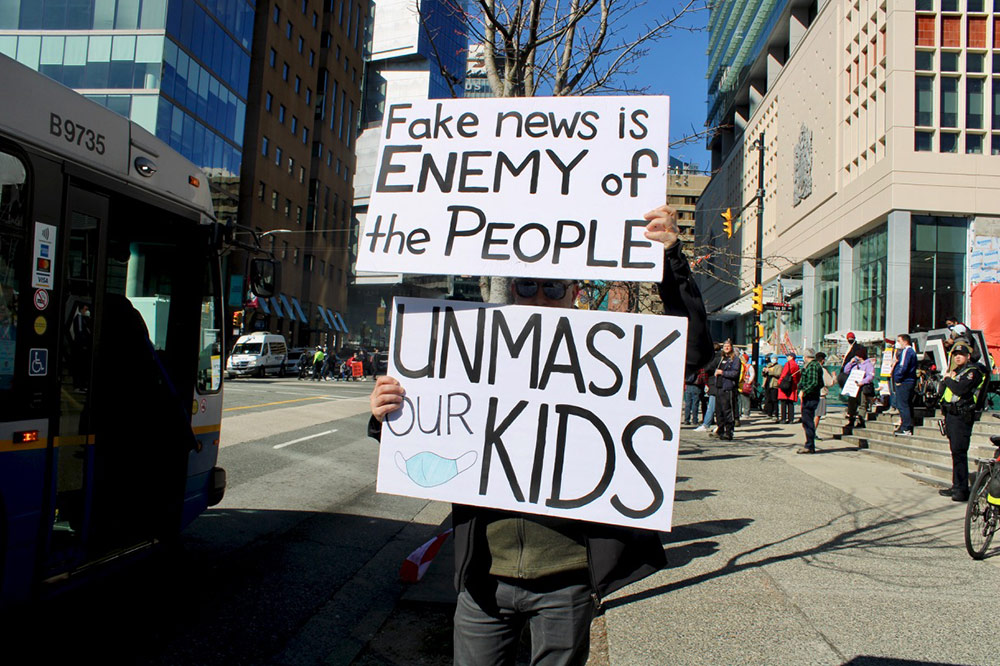
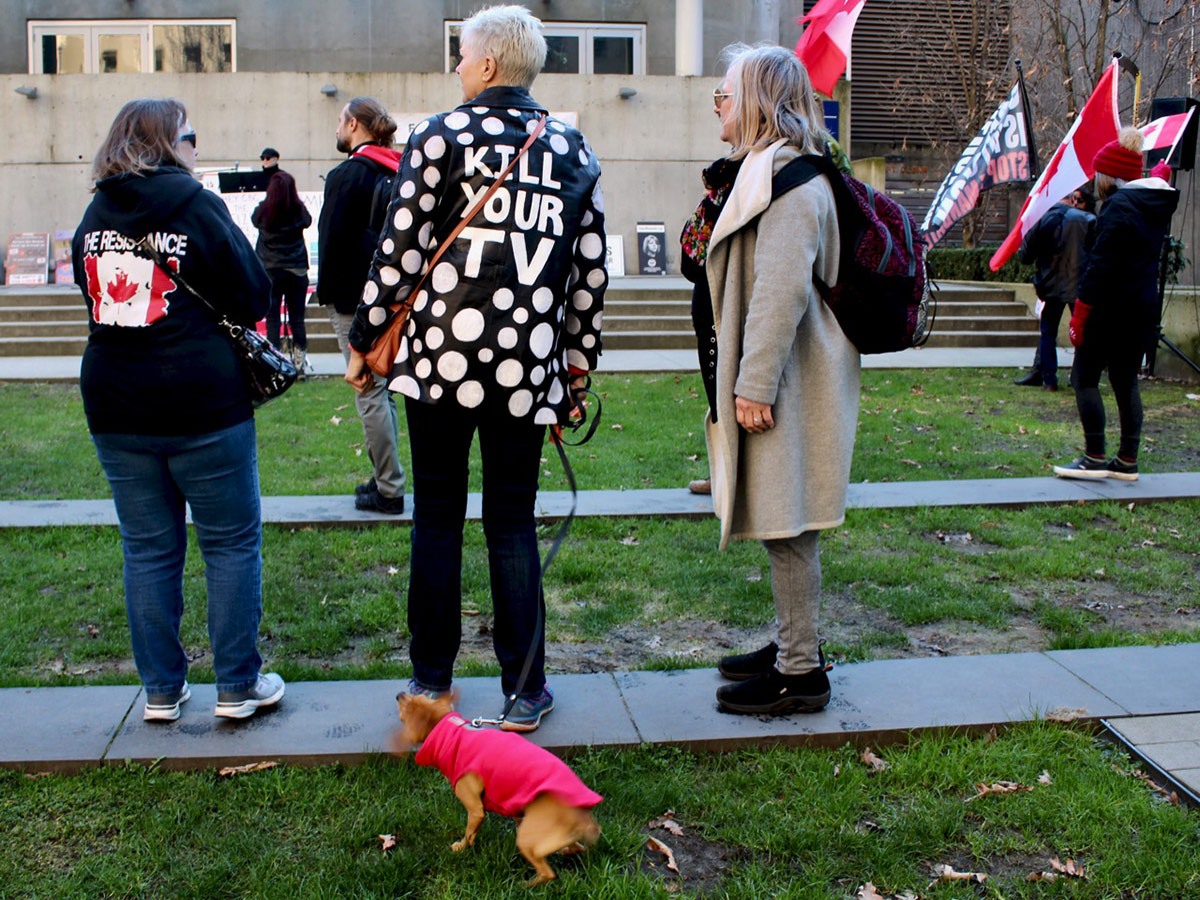
Amarnath Amarasingam, a professor of religion and political studies at Queen’s University, said that while people have been interested in conspiracy theories for a long time, belief in things like UFOs or the 9/11 truth movement haven’t usually entered mainstream politics.
But over the past few years, conspiracy theories like QAnon, the Great Reset and the anti-vaccine movement have become much bigger in scale. Some have been given a boost by Trump, who publicly thanked QAnon believers for supporting him and spent years questioning whether former president Barack Obama was really born in the United States.
“For a lot of these movements, they feel like they hold the truth against an evil cabal of political elites,” Amarasingam said.
“They feel like the media, if they were truly doing their jobs, should be uncovering these ‘truths.’ It’s where that visceral hate comes from.”
Those beliefs are so strong, said Amarasingam, that “there’s now a sense that they represent some sort of cosmic good versus evil.”
At the protest outside the CBC in Vancouver, a woman held up a sign that read “There’s a War on Your Mind.” She told The Tyee that she doesn’t trust the CBC because, as Canada’s public broadcaster, it receives money from the government, “so they toe the government line.”
The protester, who declined to give her name, said the CBC is “no better than RT, which is being banned.” Russia Today, a news station controlled by the Russian government, was banned by the European Union after Russia invaded Ukraine on the false pretext of “denazifying” the country. EU regulators said the network was part of “continuous and concerted propaganda actions targeted at EU and neighbouring civil society members, gravely distorting and manipulating facts” to support invading Ukraine. The network is no longer being aired on TV in Europe, and was recently dropped by four major Canadian communications companies.
The protester said she prefers to get her news from the Epoch Times, a newspaper published by a media conglomerate associated with followers of Falun Gong, which has backed Trump and right-wing politicians in Europe.
A middle-aged man and woman who also declined to give their names said they prefer to get their information from Rebel News, a far-right Canadian media website that enthusiastically backed the convoy protests and has fundraised to provide legal help for protesters who blocked a border crossing in Alberta.
The man and woman also listed “alternative media, alternative blogs, and all the alternatives on the YouTube channels” as their preferred sources of news.
“Do you believe that the government is controlled by forces outside of Canada, and right now they’re trying to turn the country into slavery?” the man asked The Tyee, again referring to the Great Reset conspiracy theory that is popular among the “freedom convoy” protesters.
Amarasingam and Carvin said they’ll be watching what happens next with the convoy protest movement. Some of the leaders of the Ottawa convoy are now prohibited from accessing social media as part of court-ordered conditions, but the convoy protest helped build a large following and showed the movement could quickly raise money.
As summer approaches and the weather gets warmer, the size of gatherings could increase, Carvin said. A new convoy, organized by a key “freedom convoy” organizer, is reportedly heading to Victoria and plans to arrive on March 14.
“What happens when the pandemic has gone? This movement is going to have to frame itself around a new issue. And that issue may be oil and gas and natural resources, it may be the cost of living,” Carvin said.
“The thing that I worry about is that it’ll be about immigration.” ![]()
Read more: Rights + Justice, Coronavirus, Media




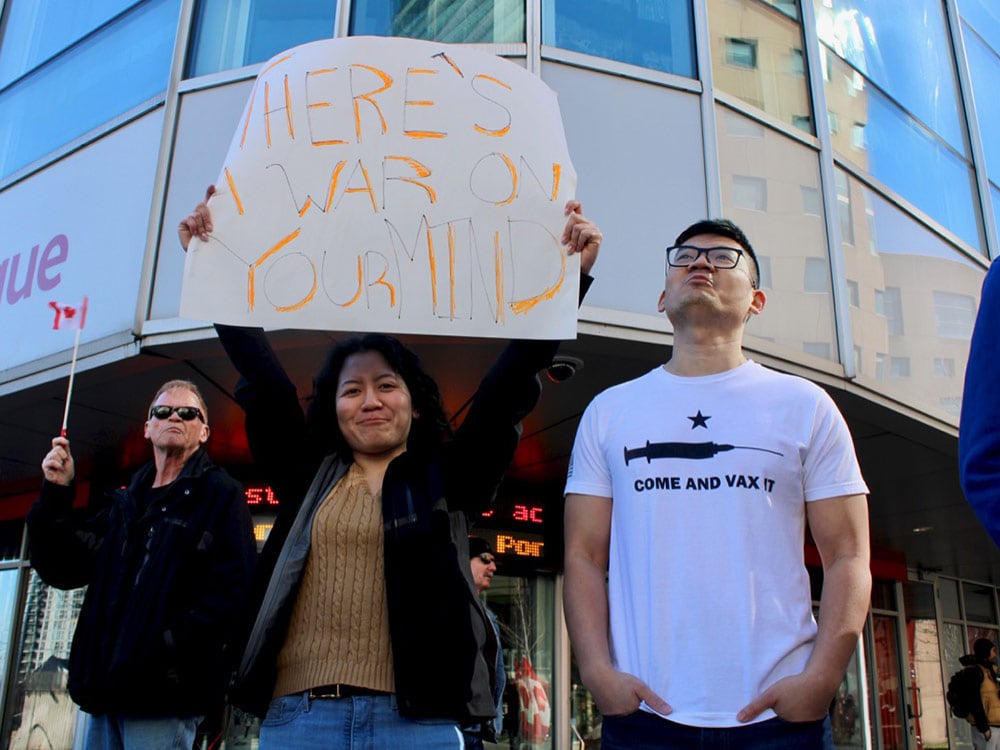












Tyee Commenting Guidelines
Comments that violate guidelines risk being deleted, and violations may result in a temporary or permanent user ban. Maintain the spirit of good conversation to stay in the discussion.
*Please note The Tyee is not a forum for spreading misinformation about COVID-19, denying its existence or minimizing its risk to public health.
Do:
Do not: